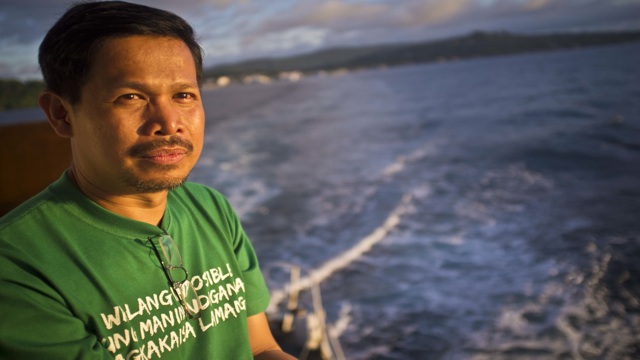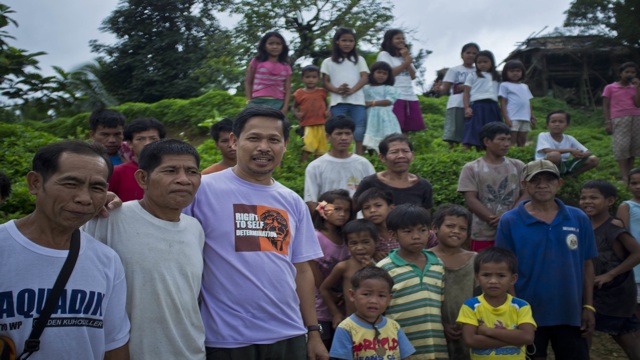SUMMARY
This is AI generated summarization, which may have errors. For context, always refer to the full article.

ORIENTAL MINDORO, Philippines – Convictions are the stuff people are made of.
Our career preferences and lifestyle choices are all motivated by convictions we hold dear.
For the young Edwin “Edu” Gariguez, even while he was still studying for the priesthood at the Ateneo De Manila University, he was convinced that the church must be a Church for the Poor.
Originally belonging to the Diocese of Lucena, Fr Edu set himself and his ministerial work for Oriental Mindoro where he could be of service to indigenous communities in the area.
“My diocese is rather well off and I was challenged by the possibility of doing my ministry among the Mangyans,” recalled Gariguez in an interview.
Little did the newly-ordained Gariguez know that his willingness to take on this challenge would direct him to a battle he never envisioned for himself.
“My passion and a big part of my involvement then was human rights – particularly in pursuing the rights of the indigenous peoples for their ancestral domains and the rights of poor farmers for the land they till.”
Ten years into his ministry, Gariguez shifted his focus. Responding to the call of the time, he found himself in the early 2000s at the forefront of the Mindoroeños’ fight against large-scale nickel mining.
About 4 months ago and thanks to the nomination of a fellow development worker, he was awarded the 2012 Goldman Environmental Prize with an award of US$150,000 for the furtherance of his cause. He is the second Filipino to be granted this award.
Why mining?
Responsible mining, Gariguez maintains, is a myth. The safeguards provided by law are tokenistic, and the system, which is far from incorruptible, relies heavily on the assumed compliance of actors involved.
(For more content on mining debates, access Rappler’s #WhyMining micro-site)
Under the Mining Act of 1995, the Philippines does not prescribe royalty payment from the extractive mining industry actors.
Gariguez pointed out that the Philippines is the only country in the world that does that.
“Other countries can have as much as 35% royalty payment, but for the Philippines, it’s zero. What we get as what you call ‘revenues’ are in the form of excise tax, which is only 2%,” he added.
Gariguez believes that the current legal framework does not take into account externalities, particularly environmental costs. The private sector will reap the benefits of the nation’s natural resources, while the affected communities will bear the brunt of their resource extraction.
In the last quarter of 2009, when the transnational Intex was granted an “anomalous” Environmental Compliance Certificate (ECC) essentially permitting them to commence mining operations in Mindoro, Gariguez knew it was time to up their game. They had, according to him, exhausted all avenues and forms of protest. A more drastic action was in order.
Together with Mangyan tribal leaders and support sectors, the environmental priest went on a hunger strike and camped out in the central office of the Department of Environment and Natural Resources (DENR). This led to the revocation of Intex’s permit to operate.

Inclusive development model
The neo-liberal model for development already incorporates the rights of indigenous peoples (IPs), but there remains a need to translate theory into practice.
For Gariguez, the best part of his pastoral work with the Church-based NGO Mangyan Mission is his constant exposure to, and consequent appreciation of, the cultural tradition of the IPs. “Which is,” he added, “sadly being eroded by the lowland’s predominantly consumerist values.”
In his dissertation, he wrote that the accumulation of “surplus wealth” was deemed unnecessary by the IPs as what they needed for food was provided for by “the productive bounty of the land.”
Their paradigm of development, therefore, goes beyond monetary gains and is more concerned with community well-being and the natural environment. He contrasted this with the concept of development of national government and corporations, which invests largely on “the acquisition of visible material comforts or benefits.”
Gariguez’s dissertation was a requirement for his doctorate degree in Applied Cosmic Anthropology.
This brave soul could have chosen comfort over his convictions. He could have led an easier life in his first diocese which was closer to home. Instead, he decided to stick to what he believed in: That the church must be a Church for the poor. – Rappler.com
Add a comment
How does this make you feel?
There are no comments yet. Add your comment to start the conversation.